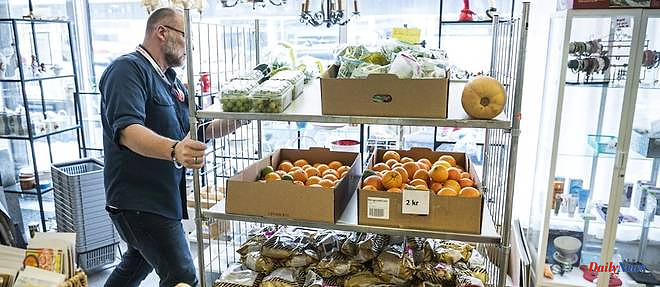It's barely six o'clock in front of Stockholm station and there are already dozens of homeless people queuing for some cinnamon pastries and a cup of coffee, an unprecedented crowd according to associations helping the poor.
Struck by record inflation for more than thirty years and threatened by recession, Sweden has seen the apparent signs of poverty multiply against a background of rising inequalities in recent years.
“As you can see, a lot of people came for breakfast,” says Kavian Ferdowsi, the food distribution initiative. "In the thirteen years that I have been in charge of this association for the homeless, I have never had so many people, I see more and more people who are just looking for a little help," he told the newspaper. AFP.
The repercussions of the war in Ukraine combined with rising interest rates and falling house prices putting pressure on the finances of many indebted households make Sweden's economy one of the most controversial. concern in Europe.
After a spike in electricity prices at the start of winter, it is now food prices that are panicking with a 20% increase over one year, unheard of since the 1950s.
The government announced on Wednesday a meeting soon with the three major supermarket chains in Sweden to tell them that any unjustified increase is "unacceptable".
After peaking at 12.3% in December, headline inflation is struggling to slow despite the central bank's sharp rate hike. After slowing down slightly in January, it even rose unexpectedly in February, to 12%, according to statistics published on Wednesday.
“The first wave of inflation was just energy prices and a few imported foodstuffs. But then it spread to the whole economy,” notes Annika Alexius, an economist at Stockholm University.
The most modest households in the country are the most affected, but also the middle classes among the most indebted in Europe and faced with a sudden increase in their real estate bills, she told AFP.
In a Red Cross office in the Swedish capital, unsold supermarket items are offered for sale at discounted prices.
Marianne Örberg, a 73-year-old pensioner, comes here twice a week. In his basket for the day, a bunch of radishes, a few pieces of bread. If she wants to make it clear that she is not the most to be pitied, she also explains that she is trying not to burden her savings.
"People have changed their eating habits. We eat differently today to keep accounts and initiatives like these are very, very, appreciable", says this former lawyer.
The people in charge of the Red Cross, they see the face of the people who come.
“Before, we only saw people living on the fringes, now that has changed. AFP its secretary general in Sweden, Martin Ärnlöv.
In low-income Swedish single-parent families, nearly one in eight households said they had trouble feeding their children and experienced hunger, according to a survey commissioned by the organization.
Long one of the most egalitarian countries in the world, Sweden has seen wealth gaps increase sharply over the past three decades, the result of reforms that have straightened out public accounts and brought out new champions of the European economy, but weakened many Swedes. .
According to the national statistical office, nearly 15% of Swedes are at risk of poverty, i.e. below 60% of the median income which is around 33,200 crowns (2,950 euros) per month.
According to the latest forecasts from the European Commission, Sweden will be the only EU country to experience a recession in 2023.
The currency, the crown, is suffering on the foreign exchange market and calls are increasing to strengthen social aid in a country where the welfare state remains a safety net.
But for the economist Annika Alexius, the country could especially prefigure a rough year everywhere in Europe.
"Let's say that we are a little ahead of other European countries in this recession. Other European countries will also be faced with a worsening situation," she said.
16/03/2023 09:46:06 - Stockholm (AFP) © 2023 AFP












